- Home
- Ron Chernow
Grant Page 3
Grant Read online
Page 3
The boy grew up in a household that percolated with political commentary. With politics his first love, Jesse contributed to a lively newspaper called The Castigator that made its local debut in 1826. He relished controversy, publishing pungent polemical essays on a variety of topics. His literary style leaned heavily on sarcasm, and his bruising diatribes earned him a host of enemies. When disputing one opponent, he gave this self-description in a piece he signed PLUTO: “Now sir, I am a little dog, and generally disposed to be peaceable, but when a BIG DOG snarls at me, I will at least show my teeth.”23
The paper’s editor was David Ammen, a passionate abolitionist. Slavery was an incendiary topic in the town by virtue of its geography. Ohio had been the first state carved out of the old Northwest Territory, where slavery was banned by ordinance in 1787. At the same time, Georgetown stood just ten miles from the Ohio River, where runaway slaves from Kentucky made a spirited dash for freedom, often with slave catchers in hot pursuit. So commonplace was slavery in Kentucky that bondsmen constituted one-fifth of its prewar population. Many southern Ohio residents, originally from Kentucky and Virginia, sympathized with slave owners. It took real gumption for Jesse Grant and David Ammen to stand up to proslavery sentiment in this solidly Democratic town. Reared in this borderland area, with the town split harshly over slavery, Ulysses S. Grant was exposed as a boy to both sides of the controversy, perhaps breeding a spirit of tolerance later evident at Appomattox.
Both Jesse and Hannah Grant began as rabidly partisan Democrats who voted for Andrew Jackson. Jesse took to the pages of The Castigator to defend Jackson’s veto of the charter for the Second Bank of the United States, a symbol of concentrated financial power, suggesting that only those with “the hateful taint of aristocracy” disputed the move.24 The Democratic persuasion ran so deep in Georgetown that it continued unabated during the Civil War. As Ulysses later observed, “There was probably no time during the rebellion when, if the opportunity could have been afforded, it would not have voted for Jefferson Davis for President of the United States, over Mr. Lincoln.”25 For all that, the small town would enrich the Union cause with no fewer than four generals.
Propelled by a thrusting ambition, Jesse was a persistent if frustrated politician, a perennial candidate who was “made secretary of almost every public meeting which I attended where clerical services were required.”26 In 1830 he ran unsuccessfully for Georgetown mayor, lost a bid for the state legislature two years later, then failed in his effort to become a justice of the peace. Although the hot-blooded Jesse lacked the winning charms of a candidate, he ascended to town mayor in the late 1830s. In the 1832 elections, he abandoned the Democratic Party, switching his earlier position on the bank issue and suddenly favoring its renewed charter. This sparked a heated clash with his friend Thomas Hamer, a lawyer who ran for Congress on an orthodox Jacksonian platform. A self-made man born to poor Irish parents, with a thick thatch of reddish hair, Hamer had educated himself with borrowed books and risen to become speaker of the state legislature. In a blistering attack, Jesse wrote that Hamer cared “not who sinks so as he swims . . . he is alike faithless in his political principles, and his personal attachments.”27 Jesse’s apostasy brought their friendship to an abrupt close. Hamer’s flourishing career as the leading figure in county politics would hamper Jesse’s future chances in that realm.
Before long, Jesse popped up at conventions for the new Whig Party, a political tradition that Ulysses absorbed as a boy. Jesse revered Henry Clay, who led the Whigs from 1834 to 1846, endorsing his American System of internal improvements, high tariffs, and a national bank—an orientation later reflected in his son’s presidency. The Whigs denounced what they saw as the overweening executive power of “King” Andrew Jackson, selecting the “Whig” name to liken their struggle to that against King George III. Abraham Lincoln ventured into politics as an ardent Whig, characterizing the party as one founded to depose that “‘detestable, ignorant, reckless, vain and malignant tyrant,’ Andrew Jackson.”28 By 1831, when William Lloyd Garrison initiated publication of The Liberator, Jesse had embraced the antislavery position of some northern Whigs, even though this strained relations with many conservative townspeople and family members in Kentucky.
The Whig ideology featured a strong moralistic component that doubtless resonated in the straitlaced, church-going Grant household. To strengthen the country’s moral fiber, many Whigs wanted to expand the school system and favored Sabbath observance. They inveighed against the menace of alcohol, which was both a national problem—by 1830 each American drank, on average, seven gallons of pure alcohol per year—as well as a local scourge in Brown County, which had two dozen distilleries and many grape-growing sections. When the journalist Albert Richardson visited Georgetown for a biography of Grant published in 1898, he reeled at the prevalence of alcohol abuse: “To be temperate in Brown [County] means to be intoxicated only two or three times a year.”29 While Jesse Root Grant has gone down in history books as a headstrong temperance advocate, there are scattered suggestions that he might have wrestled early on with his own drinking demons. One person remembered him as “a low, drunken common fellow—who loves his whiskey above all else.”30 A second said he “was a Kentuckian in his liking for whiskey,” while a third said Jesse “would take a drink but never pay for it.”31 Since Jesse’s own father was ruined by drink, it would not have been surprising if he had championed the temperance movement as a way to conquer his own powerful temptations. Rumors of his drinking did not recur later on, suggesting that, if he had a problem, he had conquered it.
At first glance, there seemed something forgettable and colorless about Ulysses S. Grant in his youth. He had nothing wayward or rambunctious in his nature and seldom wandered off into skylarking mischief with other boys. Like his mother, he was self-contained, as if he had trained his face to mask emotion and keep his inner life secret. Also like Hannah, he was uncommonly even-tempered. When he was only two, Jesse dared a neighbor to fire a pistol near his son, sure he would take it in stride. Instead of erupting in tears, the child seemed to revel in the loud noise. “Fick it again!” he cried. “Fick it again!”32 The incident set a lifelong pattern of Grant appearing impervious to physical danger.
In respect to the boy’s appearance, Jesse rendered a mixed verdict, contending that Ulysses “was our most beautiful child; but I thought he did not grow up as handsome as our other boys.”33 If his stoop-shouldered gait was inelegant, it bespoke a firm sense of purpose. “He was always a steady, serious sort of boy who took everything in earnest; even when he played he made a business of it,” Hannah recalled.34 One cousin remembered a “short, stout boy” who never talked much and stayed at home a great deal, “but he had more determination than any boy I ever saw.”35 Often, amid gangs of rowdy youths, he stood apart, as if lost in thought. “He was more like a grown person than a boy,” declared one school chum.36 As befit this seriousness, Grant gravitated to older boys, always speaking in a clear, melodious voice that later reminded the novelist William Dean Howells of “the soft, rounded, Ohio River accent” he had heard from his “steamboating uncles.”37
Though never a smooth boy, skilled in social graces—he could be awkward and flustered in large groups—Ulysses exhibited a strict Methodist propriety. No dancing, card playing, or cursing was tolerated in the proper Grant household. “It has been a principle of mine never to swear at any time in my life,” Ulysses attested in future years.38 Even as a raw country boy, he allowed himself no oath stronger than “Thunder and Lightning!” Once, when quarreling with an acquaintance, he was provoked to say “Darn.” During the Civil War, Grant recounted this episode to someone who recalled him saying “that the very sound of the word to his ears bothered him, so that for an entire week it continued to literally haunt him.”39 He spent a lifetime avoiding the coarse jokes and bawdy anecdotes that were commonplace in the military. “He revered women and thought such stories demeaned the female sex,” said a cou
sin. “I have seen him freeze up a man instantly with a look when a vulgar story was told in his presence.”40
As part of their Methodist austerity, the Grants frowned upon liquor consumption and not until age eleven did Ulysses steal his first forbidden taste of alcohol. Since cholera cases had appeared in town, local authorities dispatched Jesse to Maysville, Kentucky, to obtain a sweet blackberry cordial that purportedly contained medicinal qualities. When the cholera threat abated, Jesse stowed the liqueur in his cellar. When his parents went off to church, Ulysses and his friends sneaked downstairs on several occasions and gulped large quantities of the sugary spirits.41
Impeccably polite and usually (but not always) neatly dressed, Ulysses reflected Hannah’s prim parenting. He preferred innocent pastimes, such as swimming, playing marbles, or ice-skating. While he delighted in fishing barefoot in summer, seated by a brook near the tannery, he seldom hunted and derived no pleasure from the casual butchering of animals. “He was unusually sensitive to pain,” said a friend, “and his aversion to taking any form of life was so great that he would not hunt.”42 Such a tame boy inevitably became the butt of mockery, and Grant grew sensitive to public humiliation. Never one to initiate a fight, he refused to back down when bullied. He was roused to fury if sadistic boys tormented an innocent child or a defenseless horse, and smaller boys embraced him as their steadfast protector. On one occasion, Grant saw a big, oafish boy named Slifer picking on a much smaller boy. “Grant stepped forward, rolled up his sleeves, and told Slifer that he shouldn’t fight that little fellow; that if there was any fighting to be done he could fight him,” said a cousin.43 Grant never deviated from this philosophy, which he later applied to his eldest son. “I do not want him to feel afraid to pitch in when boys impose on him but he had better avoid boys who are inclined to quarrel.”44
In the absence of free public schools, Jesse sent his son to a small brick subscription school, perched on a nearby ridge, with boys and girls seated on long wooden benches and segregated in adjoining classrooms. Ulysses remembered John D. White, the village schoolmaster, as a “kind-hearted” and “respected” man, who nonetheless lashed with beechwood switches any boys who dared to misbehave.45 Grant already stood out for his terse expression and unruffled nature. Another teacher, Isaac Lynch, praised his “quiet demeanor, studious attention to his books, and remarkably good behavior.”46 With his bashful nature, Grant found public speaking “unbearable” and only submitted to this torture “by the greatest exertion.”47 Though a conscientious student, he excelled solely in mathematics. Drawn to history and politics, he read The Life of George Washington and avidly followed the newspapers. Jesse Grant promoted literacy at home, amassing a library of thirty volumes. Regretting his own lack of education, he wanted to drum learning into his children’s heads. Ulysses conveyed a vivid sense of his father’s insatiable thirst for knowledge. As a boy, he had “read every book he could borrow in the neighborhood where he lived. This scarcity gave him the early habit of studying everything he read, so that when he got through with a book, he knew everything in it.”48
Jesse Grant committed the common error of willful fathers who try to stimulate their sons and overpower them instead. He doted on his eldest boy, smothering him with attention and attempting to live vicariously through him. Reluctant to assert himself against his bossy father, Ulysses quietly resented the pressure to succeed, and Jesse was perplexed that his son “never seemed inclined to put himself forward at all; and was modest, retiring, and reticent.”49 Instead of accepting this, Jesse prodded the boy mercilessly at every turn. When he took Ulysses on a trip to eastern Ohio, a telling scene unfolded, recounted by a friend. “At this time Ulysses though young could read very well, of this his father was naturally very proud, and when they arrived at their destination, to his little son’s dismay, he brought out a school reader, and telling his friends of how beautifully Ulysses could read, proceeded to open his book and requested him to read something, but Ulysses declined absolutely and stuck to it, to his father’s chagrin and disappointment.”50
From this clash between grandstanding father and stubbornly private son, Ulysses developed a deeply entrenched modesty, “a particular aversion to egotists and braggarts,” said a later colleague.51 He wanted people to discover his strengths, not have them advertised. Reluctant to flout his father openly, he developed a strategy of passive resistance, retreating behind a facade of silent obstinacy. He only stood up to his father indirectly, holding back his emotions, as if fearing their violent release. Torn between an intrusive father and a painfully retiring mother, he kept a world of buried feelings locked up inside. Even at the end of his life, one of his physicians delivered this judgment on his emotional makeup: “He is the most suppressive man I ever knew. He is not devoid of emotional nature, but his emotions from early life have been diverted from their natural channels of expression . . . What has been called imperturbability in him is simply introversion of his feelings.”52
The major outlet for Grant’s suppressed emotions was his rapturous love of horses. Hannah noted this special affinity: “Horses seem to understand Ulysses.”53 Somewhat clumsy in his gait, the boy was surprisingly graceful on horseback. Riding horses was an ideal way to escape from the social complexities of home into a world where he enjoyed complete freedom and didn’t have to kowtow to others. He liked to ride without a saddle or stirrups, sitting astride a blanket on the horse’s back, and he was so expert at handling horses that he began riding at age five. He became known for breaking in wild horses for local farmers, a sight that drew admiring spectators to the village square. He tamed even the most refractory horses through a fine sensitivity to their nature rather than by his physical prowess. “If people knew how much more they could get out of a horse by gentleness than by harshness,” Grant once observed, “they would save a great deal of trouble both to the horse and the man.”54
For all his ingrained caution, the boy proved a daredevil on a horse, riding at top speed by age five while standing one-legged on its back. He would plant one foot on a sheepskin lashed to the animal, then maintain his balance by grasping the reins. Even when he was older and used a saddle, he had a startling way of putting his left foot in the stirrup, grabbing the horse’s mane with his left hand, then swinging his body nimbly over the horse in a single lithe, fluid motion. Perhaps no story better demonstrates his mastery of horses than Jesse’s tale of when a circus came to town:
Once when [Ulysses] was a boy, a show came along in which there was a mischievous pony, trained to go round the ring like lightning, and he was expected to throw any boy that attempted to ride him. “Will any boy come forward and ride this pony?” shouted the ring-master. Ulysses stepped forward, and mounted the pony. The performance began. Round and round and round the ring went the pony, faster and faster, making the greatest effort to dismount the rider. But Ulysses sat as steady as if he had grown to the pony’s back. Presently out came a large monkey and sprang up behind Ulysses. The people set up a great shout of laughter, and on the pony ran; but it all produced no effect on the rider. Then the ring-master made the monkey jump on to Ulysses’ shoulders, standing with his feet on his shoulders, and with his hands holding on to his hair. At this there was another and a still louder shout, but not a muscle of Ulysses’ face moved. There was not a tremor of his nerves. A few more rounds and the ring-master gave it up; he had come across a boy that the pony and the monkey both could not dismount.55
When it came to horses, Ulysses was quite enterprising in dreaming up moneymaking ventures. By age eight, he drove a team of two and hauled enormous logs for his father’s business. On one occasion, he managed single-handedly to load giant timbers that ordinarily required a crew of eight. Jesse boasted about this episode, but a Simpson cousin noted that an aggrieved Ulysses returned from the encounter with tears in his eyes, convinced “his father had imposed upon him and had not treated him with justice.”56 Two years later the boy was allowed to own his own horses
and had enough self-possession to transport adult passengers to Cincinnati, a distance of 40 miles; on one occasion, his livery service extended as far afield as Toledo, 250 miles distant. Another time, when he drove two young women back from Kentucky, they had to ford a creek swollen with rainwater and Grant refused to be deterred. Without giving the women any warning, the twelve-year-old and his team plunged into the stream and “the first thing they knew the horses were swimming and the water went up to their own waists,” recalled Jesse. The ladies screamed in terror. “In the midst of the excitement, Ulysses, who was on a forward seat, looked back to the ladies, and with an air perfectly undisturbed, merely said: ‘Don’t speak—I will take you through safe.’”57 He deposited the two shaken women, soggy but safe, back in Georgetown.
Money was a black art that Grant never learned to master, and he spent years trying to live down derision elicited by his bargaining for a colt at age eight. Jesse had offered a farmer named Ralston $20 for the animal; Ralston held out for $25. Jesse sent his son to haggle with Ralston, instructing him to make a $20 opening bid, followed by $22.50 if necessary, and then settle for $25 if he must. Utterly incapable of guile, Ulysses bungled the bargaining. “When I got to Mr. Ralston’s house, I said to him: ‘Papa says I may offer you twenty dollars for the colt, but if you won’t take that, I am to offer twenty-two and a half, and if you won’t take that, to give you twenty-five.’”58 The story circulated widely to the merriment of village youth. Grant later commented, “It cost me more heartburning than almost any transaction in life.”59 He was so traumatized by the mockery that it remained evergreen in his memory. “Boys enjoy the misery of their companions,” Grant concluded, “. . . and in later life I have found that all adults are not free from the peculiarity.”60 The trusting naïveté displayed in the Ralston episode would haunt the adult Grant no less than the boy.

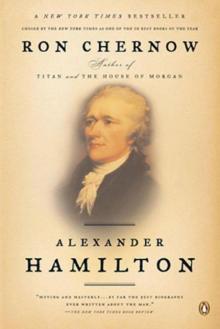 Alexander Hamilton
Alexander Hamilton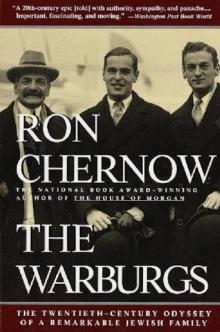 The Warburgs
The Warburgs Titan
Titan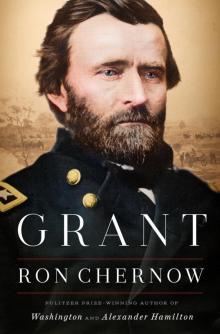 Grant
Grant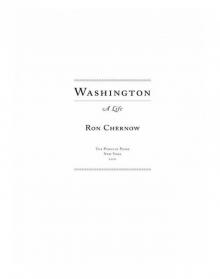 Washington
Washington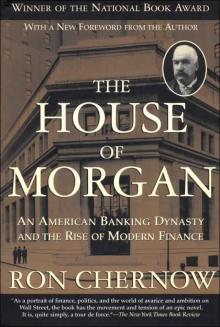 The House of Morgan
The House of Morgan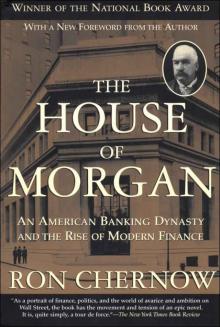 The House of Morgan: An American Banking Dynasty and the Rise of Modern Finance
The House of Morgan: An American Banking Dynasty and the Rise of Modern Finance